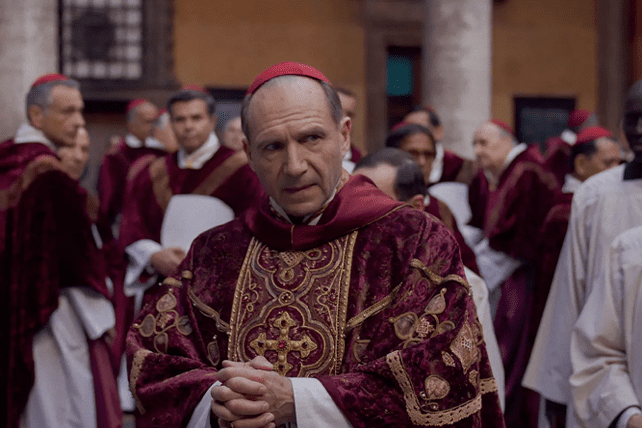“There’s much in the Catholic teachings and rules that I find very resistible, but the teachings of Christ are always, I think, going to have relevance,” Fiennes said, explaining that “all kinds of spiritual teachings” interest him.
Fiennes described a few negative experiences with the church. When he was young, “certainly in schools in Ireland, the sort of discipline was ferocious, with priests taking sticks out of their robes to hit young boys over the hand,” the actor said.
In his youth, he also encountered “elitist priests who insisted on saying the Mass in Latin when it might be good to say it in English to encourage a younger congregation,” but nevertheless Fiennes emphasizes that “these were all human beings.”
“I’ve talked to priests whose intellectual viewpoint and wisdom I really respect,” Fiennes said.
“Conclave” has already drawn the ire of Catholic conservatives because of a final revelation about the newly elected pope.
After a scandal-riddled conclave, at which several factions of cardinals describe themselves as “at war” over ideological divisions that more closely mirror European and U.S. political debates than those in the Vatican today, the cardinals elect Cardinal Benitez, whose status had been under wraps until the conclave in order to keep him safe as he led the church in Kabul, Afghanistan.
Benitez stays out of the fray of the cardinals’ bickering and subversion of each other and instead demonstrates a humble leadership style. But there is something else that sets him apart from his cardinal brothers. At the movie’s final twist, Lawrence learns after Benitez’s election that the new pope had recently discovered he is intersex — a person whose anatomy fits into neither male nor female sex categories.
Most of the conservatives enraged by the movie seem to misunderstand the condition. “In reality, the cardinal they elected was born a woman and raised as a male by her parents because she was born with an intersex condition,” Jonah McKeown, a staff writer at the EWTN-owned Catholic News Agency, writes, before interviewing a priest about why women cannot be ordained.
In his interview with RNS, Berger seemed to recognized that Benitez’s revelation would touch a nerve in today’s church. He recounted a story Harris told him about a cardinal who had written the author after the book was published to tell him that, while he enjoyed the novel, when it came to the ending he told himself “it is ultimately just a story.”
For Fiennes, it is not Benitez who raises the question of women’s ordination, but Sister Agnes, played by Isabella Rossellini, who is the only female star in the film, reflecting the lack of women leading the church.’

